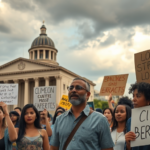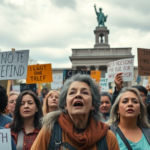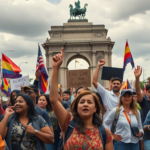Police Shooting of Inuk Man in Nunavik Sparks Outcry Over Systemic Racism
A tragic incident involving the police shooting of an unarmed Inuk man, Joshua Papigatuk, in Quebec’s Far North has reignited debates over systemic racism within Canada’s justice system. Crown-Indigenous Relations Minister Gary Anandasangaree has labeled the event as a glaring example of ingrained discrimination against Indigenous peoples, underscoring the urgent need for systemic reforms, with Indigenous-led solutions at the forefront.
Details of the Incident
The shooting occurred in the remote village of Salluit, located about 1,850 kilometers north of Montreal, when officers from the Nunavik Police Service responded to a call about a potential drunk driving incident. Initial attempts to subdue Joshua Papigatuk and his twin brother Garnet with non-lethal measures, including a stun gun and pepper spray, were unsuccessful. The situation escalated when one officer resorted to using a firearm, resulting in the death of Joshua and severe injuries to Garnet. Further investigation by Quebec’s Bureau des enquêtes indépendantes (BEI) has revealed that the brothers were unarmed, with full details yet to be disclosed due to ongoing investigations.
Community Reactions and Protests
The shooting has catalyzed widespread anger and demands for justice throughout Nunavik, prompting protest marches across the region’s 14 villages. Community members, along with Indigenous rights advocates, call for accountability and significant changes in how Indigenous communities are policed. Anandasangaree highlighted this incident as exemplifying broader systemic racism within Canadian institutions, stating, “Real, structural change is essential to address these injustices.”
Residents and local leaders are voicing concerns over the disproportionately high rates of police-related deaths in Nunavik compared to other northern areas. From 2000 to 2018, 17 Inuit died under similar circumstances, despite the region’s relatively small population of just over 11,000.
Marie Tulugak, a Salluit community organizer, emphasized the sense of vulnerability felt within Indigenous communities, “We need to ensure our voices are heard and our people are protected. The current system fails to provide the safety and justice we deserve.”
Systemic Issues in Indigenous Policing
Police forces in Indigenous communities, like Nunavik, often face significant challenges, including inadequate resources and difficulties recruiting officers due to geographical and linguistic barriers. Training for officers is limited largely to Quebec’s police academy or the Royal Canadian Mounted Police Depot in Saskatchewan, both far from the region and conducted primarily in non-Indigenous languages. Despite these obstacles, efforts have been made to improve community relations, such as equipping officers with body cameras since 2020 and renaming the force to the “Nunavik Police Service” to distance from notions of aggression.
Though these measures aim to build trust, the continuous high rate of incidents highlights the need for more profound changes. Charles Magnan, of the Quebec Association of First Nations and Inuit Police Directors, stressed that “While these efforts are steps in the right direction, fundamental changes in policy and resource allocation are crucial.”
Previous Concerns and the Path Forward
This incident is not isolated but part of a longstanding pattern of challenges where Indigenous communities feel alienated and underserved by the current justice system. The tragedy of the Papigatuk family resonates deeply, adding to the collective call for reform and reconciliation that respects and incorporates Indigenous perspectives.
Going forward, greater emphasis on Indigenous-led decisions and culturally competent policing initiatives is crucial. Community dialogues will be pivotal in identifying sustainable strategies to address these issues comprehensively. It is essential to bridge the gap between law enforcement priorities and community safety assurances.
Future Implications and Road to Recovery
The ongoing investigation by the BEI and subsequent findings will play a critical role in shaping future policing practices and policies in Indigenous territories. The outcomes could prompt reevaluation and restructuring of resource distribution, training methodologies, and community engagement models within police services across Canada.
In the meantime, local resources are being mobilized to support the community. Mental health services and legal aid are being offered to those affected by this incident, ensuring that support systems are in place as the region navigates this difficult period.
In conclusion, the tragedy in Nunavik reinforces a pressing need for dialogue, understanding, and transformation—ensuring that justice and safety are equitably extended to all communities, particularly those that have historically been marginalized. As calls for systemic reform grow louder, Woke News remains committed to highlighting these issues, fostering community interest, and advocating for meaningful change across the region and beyond.







